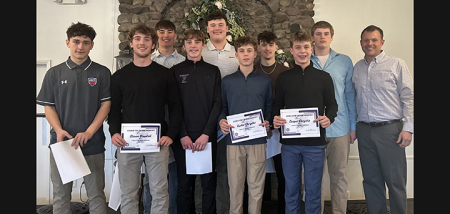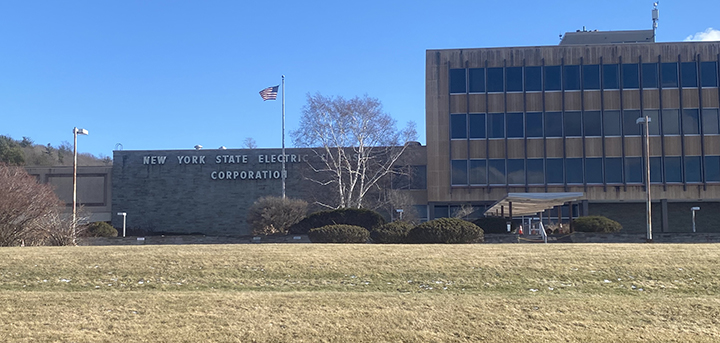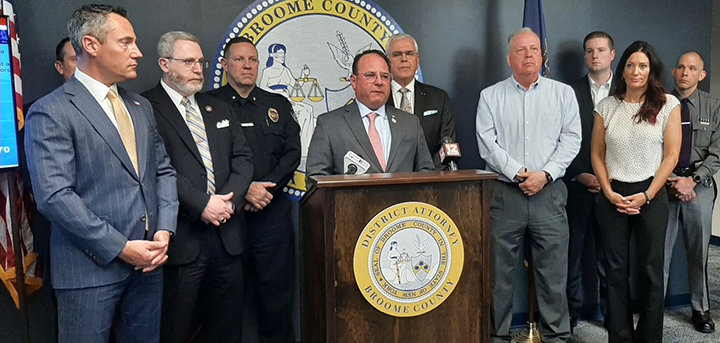PROGRESS 2021 – Reese-Marshall: New Leadership Meets Steady Demand With A Dedicated Staff
Published:
February 12th, 2021
By:
Tyler Murphy
 Division President Lisa Colabelli took over Reese-Marshall this summer in the middle of the pandemic. Demand for fuel has not changed but some customers have struggled with a lack of employment. (Photo by Tyler Murphy)
Division President Lisa Colabelli took over Reese-Marshall this summer in the middle of the pandemic. Demand for fuel has not changed but some customers have struggled with a lack of employment. (Photo by Tyler Murphy)
NORWICH - Reese-Marshall transitioned to new leadership in 2020, welcoming new Division President Lisa Colabelli to lead the organization in July.
Colabelli joined the company in October 2019, a few months before the pandemic hit and transitioned into the leadership position for Reese-Marshall, based in Norwich, and Paul Oil Co., based in Hamilton.
The two companies are divisions owned by Reinhardt Corp which operates a number of energy companies in Chenango and the surrounding counties.
Well known locally, Reese-Marshall provides service to about 4,000 residents and Paul Oil Co. provides services to more than a 1,000.
Colabelli trained with the former division president, Rhonda Wightman, before taking over the job. Wightman had been with the company for four decades, and president for five years. Before joining Reese-Marshall Colabelli had worked for Frontier Communications for 29 years.
“When I came into the organization, obviously I didn’t have the background of home heating. I came from a telecommunications background. Although there are some similarities, as far as having technicians and providing service needs to your customers – in the fuel business itself I had a great deal to learn and so that was a huge learning curve.”
Colabelli spent the months leading up to the transition learning about the details of fuel types, their cost, usage and the equipment. She also had to familiarize herself with a critical part of the business, the bulk purchasing and distribution of those fuels within the company. Those operations being done in advance and without interruption are what thousands of customers rely upon.
“As far as our customer base and providing pricing, all that was quite a bit to learn in a fairly short amount of time,” she said.
Doing business in a pandemic
Colabelli took over as president in the middle of a pandemic and a state ordered lockdown, but the fuel service delivery industry was deemed an essential business.
The health and safety measures put into place changed how the business would normally operate. The company saw more customers struggling to pay their bills and Reese-Marshall adopted a more flexible approach and payment methods to reflect the unprecedent economic challenges many loyal customers are facing due to COVID-19
“Once we headed into the pandemic, we found we were starting to have more customers - because of reduction in employment, those customers were experiencing some challenges and so we had to work with them to help them through this difficult time,” she said.
“Because if they’re on a reduced income they might say, ‘Is there payment arrangements that I can make? Because I just can’t meet what I really would have traditionally done, where I pay my monthly bill.’”
For customers facing very serious economic challenges Reese-Marshall helps direct them to local resources like the Home Energy Assistance Program (HEAP).
“We work with them as best we can offer them, if they are in a situation where they really just don’t have anything and they really need some fuel, we tell them about HEAP and the availability of that, how they could check with the county to see if they qualify,” said Colabelli. “We try to work with them as best we can, but then also point them in the direction if they need other resources to help them.”
Farmers are a big part of Reese-Marshall’s business.
“We have a special farmers’ program that we run where there’s special pricing for them. Once you get into that, because of the volumes being used, there is a special program that provides reduced pricing.”
Being such large and consistent customers, the company did everything it could to help those having financial trouble, because an investment in those kinds of large customers is really an investment in their own company long term, explained Colabelli.
“They certainly use a great deal of diesel. The tractors and farm equipment and everything that goes into that. Quite a few of them use large volumes and so that really grows that side of our business. Because they use so much, we can get bulk pricing options regular residential homes likely can’t, and that can help save costs,” she said.
With all of the company’s efforts to help those struggling to pay their bills, she said “I think that it has to be individualized on a case-to-case basis.”
Another challenge was being able to provide services in customers’ homes, such as repairs, installs or cleanings to heating systems.
“There was a little reduction there. The repair side stayed consistent, but our installs and our cleaning people were a little more hesitant to have people come in to do those things, so they held off,” said Colabelli.
“Customers didn’t necessarily want us to come into their homes during the pandemic, there was a lot of uncertainty in people’s minds when it first started and even still now.”
So, the company did everything it could to provide proper protective equipment.
During house calls technicians had to wear a mask at all times, sanitizing their work area and vehicles.
They asked customers to maintain a 6-foot distance, with the company sending out educational materials and other information to customers before technicians arrived.
“Even when taking the calls, we remind them that while our people are there, please make sure you adhere to that, for their safety as well as our employees’,” she said.
The company basically took the recommendations of the CDC and New York State and applied them.
“People do ask questions while you are there, and we focus on answering them best we could. I think most people are pretty familiar with what was being directed by the CDC, so that it wasn’t really a surprise to them. It was really just reminders because we’re just not used to it. That wasn’t our life prior, so we always had to continually just remind folks of what we need to be doing,” said Colabelli.
Also, because of the pandemic the company closed its doors to walk-in customer traffic.
They also installed glass protectors at counters so those arriving for appointments can feel comfortable coming in. Reese-Marshall is headquartered at 6254 County Road 32, in Norwich.
“We learned that we have to certainly be flexible in trying to assist the customers during this tough time,” said Colabelli.
Demand stays the same as staff make changes
The company itself did not experience a financial hardship due to the pandemic, with demand remaining steady.
“Because the customers need to heat their homes, right? We’ve been able to maintain pretty well,” said Colabelli. She said the changes in weather and other routine factors in the energy markets were more of a concern, not customer demand.
She said though service calls were down, demand for heating slightly increased, “Probably from using a little bit more, because they are home all day. They tend to want to keep it a little bit warmer but we haven’t seen a huge change from it, but there’s a little change there.”
Reese-Marshall delivers fuel to customers, but in addition they also install air-conditioning.
Specially trained burner technicians conduct the cleaning, new installation and repair services to home furnaces and fuel systems.
The company also maintains a 24 hour, seven days a week support hotline, for any customer having serious troubles or needing emergency repairs or an emergency delivery.
Though most of the services are provided to regular fuel customers the company will offer assistance to anyone who needs it, so long as the regular customers are not impacted.
The company reorganized their office and the staggering of shifts to help isolate possible contamination between staff.
“They’re coming in and getting their day started, we didn’t want everybody gathering at the same time, in the same place, so we staggered of shifts,” she said.
“The biggest difference is how we interact with one another. It’s more remote interaction with the customers, versus face to face, or an email from an office perspective. Out in the field for the drivers, things stayed pretty much the same because most of the time the customers don’t really approach them but we did communicate to them that if they needed to make a payment to tell us where they’re going to leave that payment so there wasn’t a need for direct contact with each other,” she explained.
Reese-Marshall employs a number of fulltime workers, including five burner technicians and six drivers for fuel delivery.
Both jobs require special training and certification by New York State, especially the technicians working on home furnaces.
“You do have to have some certifications with that, we often will hire people on and train them and help them to get any certifications they need depending on what roles we’re going to have them use,” said Colabelli.
She said finding qualified people in the area can sometimes be a challenge and she had been working with other local fuel companies to develop a plan together that would offer educational and training opportunities to people in the community.
“It is a difficult position to actually find a lot of experience out in the communities and that’s one thing that I would really like to see change is to get some training sessions that help and created by the different fuel companies in the area. We would provide the info of what our basic needs are to get somebody started in that type of position, so that it can help with the employment of people in the area but also meet the needs of our organizations.”
She said it can take years to really become an expert because equipment changes over time and many in the area use older systems.
“In the winter time, certainly the burner department has its hands full. There’s a lot of people with older furnaces and they will tend to have more issues with them as they start running more often.”
The pandemic impacted the larger market for fuel initially, but after sharp changes in pricing for a short period of time, rates stabilized and have remained consistent.
“We really haven’t seen too much actually, we did at one point when I think everyone knows that the oil prices tanked, and customers were like ‘Wow you know it’s really down a barrel’ and so they were questioning where the pricings were and stuff, but that didn’t really last that long. It didn’t impact much,” she said.
Planning ahead
One of the major impacts on the company is the scarcity of getting parts and equipment.
“I think it’s just the availability of materials and of course the time, the shipping time. Which is why we need to order parts and things ahead, to give extra time for those to be shipped in because all of your other businesses out there are also being impacted and that has reduced down some of their production,” said Colabelli of the supply chains.
“As soon as we knew that this was starting to occur, we did order ahead. Even with that you still experienced some lag, but we were at least trying to build up our inventory for tanks and things like that so that we would not get into a situation where we didn’t have any available to us.”
She said parts that used to take two or three days to get can now take two weeks to five weeks to come in. Others are temporarily unavailable altogether for a period of time.
Colabelli has made staff a priority during the pandemic. When work slows staff are now taking that time to work on improvement to the Norwich facility, or go through a checklist of other projects to improve the work environment.
“We’re really proud we were able to keep our employees all employed throughout this and during slower times had our employees for things that needed to be done here on the facility,” said Colabelli.
Employees reviewed the whole facility. Staff painted the building, replaced flooring, and did a lot of reorganizational work. They also built a new bathroom.
“A lot of those things we just took advantage of that time. A lot of our staff have skills outside of the work environment and we put those to use,” she said.
“I am very hopeful that we’ll be able to open the front door and start more of the face to face with the public.”
“Certainly, I always try to make sure employees know they are at the forefront of my concerns and making sure that they feel comfortable coming to work and that reinforcement is making sure we internally follow the proper protocols,” she said.
“With the vaccines rolling out I’m very hopeful that we’ll start to see things working toward what you would call normal, but I’m not sure we’ll ever get 100 percent there.”
Reese-Marshall supports the United Way, the Chenango Memorial Foundation, local law enforcement and are a member of the Commerce Chenango.
Colabelli is a board member for the Chenango Memorial Foundation and a former board member of the United Way.
Author: Tyler Murphy - More From This Author
Comments








